#learn korean
Event Posts + Culture/History Posts Masterlist
<Event Posts>
[2019]
추석 송편 특집 (Chuseok Songpyeon special)
[2020]
March 1st movement day (3.1절 Samiljul)
Corona Virus-what’s going on + Vocab List
The April Revolution (4.19 혁명)
May 18th Democratization Movement (5.18)
Chobok(초복) First of the three dog days + Vocab List
Korean Independence Day 8.15 광복절
Halloween Post-Korean Ghosts and Monsters
<Korean Culture & History>
Culture: Korea’s flag, Taegeukgi
Art: Interview with a Korean Traditional Music Student
Learn Korean with K-dramas – Hotel Del Luna
History Traveling: Trip to Deoksugung palace
Korean Snacks – Choco Pie (초코파이)
Learn Korean with Songs- Twenty Three (스물셋, IU)
Korea’s hero, Admiral Yi Sun Sin (이순신 장군)
Korean Movie: Extreme Job (극한 직업)
Learn Korean with Songs-Butterfly(BTS)
Korean Movie-Dongju; The portrait of a Poet (동주)
Hanbok(한복) Korean Traditional Clothes
What’s on Korean Coins and Bills
Life as a Korean Student-Reading(Studying) room 독서실
A painter of the Joseon Dynasty, Shin Yun-Bok (신윤복) + Vocab
일월오봉도 (Ilwol Obongdo, painting only for the King)
Life as a Korean Student- Academic Grading system (9등급제)
Constellation and Korean Year counting method
Korean Traditional Poem, Sijo (시조)
Korean Traditional Beverages (한국의 전통 음료)
Korean Family Names (우리나라 성씨 소개)
Introducing Ramen in Korea (우리나라 라면 소개)
VOCABULARY LISTS: MASTERPOST
[Vocabulary by Topics]
-Vocabulary: Jobs (occupations 2)
-Vocabulary: School/School subjects
-Vocabulary: Positive Emotions
-Vocabulary: Airport, Airplane
-Vocabulary: Everyday objects at home
-Vocabulary: Electronic Devices
[Hanja, Idioms, Proverbs]
-Korean Proverbs and Vocabulary
-Learn Korean with Hanja - 화 (化)
[Vocabulary by parts of speech]
-Vocabulary: Active and passive verbs
updated 2021/03/19
*All verbs below are in original form(dictionary form).
존재하다 : to exist
선언하다 : to declare, proclaim
목격하다 : to witness
제안하다 : to suggest
조언하다 : to advise
개입하다 : to intervene
헌신하다 : to devote
축하하다 : to congratulate
환영하다 : to welcome
접근하다 : to approach
투자하다 : to invest
개선하다 : to improve
응원하다 : to cheer, support
설명하다 : to explain
오해하다 : to misunderstand, misconceive
해결하다 : to resolve
조절하다 : to adjust
계획하다 : to plan
보호하다 : to protect
조사하다 : to investigate
확인하다 : to check, verify, confirm
출발하다 : to depart, set off, start
도착하다 : to arrive, reach
설득하다 : to persuade
양보하다 : to yield, give way
희생하다 : to sacrifice
쟁취하다 : to achieve, win
야기하다 : to cause, bring about
실수하다 : to make a mistake
긍정하다 : to affirm
부정하다 : to deny
생산하다 : to produce
소비하다 : to consume, spend
인정하다 : to admit
소유하다 : to own, possess
봉사하다 : to serve, do volunteer work
유지하다 : to maintain
보조하다 : to assist
인용하다 : to quote, cite
대표하다 : to represent
선택하다 : to choose, select
거절하다 : to reject, refuse
촉진하다 : to promote, accelerate, boost
요구하다 : to demand, ask
사과하다 : to apologize
추측하다 : to guess, suppose
간섭하다 : to interfere
낭독하다 : to read aloud
관찰하다 : to observe
추구하다 : to pursue, seek
Written and edited by Admin Yu

눈 : snow
첫눈 : first snow of the winter
눈송이 / 눈꽃 : snowflake
결정 : crystal
서리 : frost
함박눈 : big snowflakes
진눈깨비 : sleet
눈보라 : blizzard
우박 : hail
폭설 : heavy snow
만년설 : perpetual snow
설경 : snow scenery
눈사람 : snowman
눈덩이 : snowball
눈싸움 : snowball fight
눈이 내리다 : to snow
얼다 : to freeze
녹다 : to melt, to thaw
하얗다 : white
새하얗다 : pure white
희다 : white
차갑다 : cold
춥다 : cold (weather)
(손이/귀가/코가) 시리다 : (hand/ear/nose is) cold
펑펑 : (adverb) shape of snow falling heavily (ex. 함박눈이 펑펑 내린다)
펄펄 : (adverb) shape of snow or powder blowing in the wind (ex. 흰 눈이 펄펄 내린다)
소복소복 : (adverb) shape of things piled up (ex. 길에 눈이 소복소복 쌓여 있다)
뽀드득 : (adverb) sound of stepping on a pile of snow
It’s snowing heavily in Korea!
-Written and edited by Admin Yu
Hello, this is Admin Hee. Today’s grammar will be regular conjugation.
Regular conjugation
The regular change of form of predicate in Korean grammar such as verbs and adjectives. At this point the predicate of a clause is the part of it that is not the subject and it consists of a stem and ending.
-Stem : unchanging part of the predicate
보- is the stem of the forms ‘보다’, ‘보니’, ‘보고’
-Ending : changing part
-다. -니, -고 is the ending of the forms ‘보다’, ‘보니’, ‘보고’
1. ‘ㅡ’ Elision (’ㅡ’ 탈락)
‘ㅡ’ is elided in front of the stem ‘-아/어’, ‘-았/었-’
- 담그- + -아 = 담가
- 슬프- + -어 = 슬퍼
- 아프다 + 아서/어서 = 아파서
Such verbs or adjectives like 끄다, 크다, 바쁘다, 따르다 are examples.
2. ‘ㄹ‘ Elision (’ㄹ’ 탈락)
When the last sound of the stem ‘ㄹ’ meets ‘ㄴ,ㅂ,ㅅ,오’ , it gets elided too.
- 살- + -는 = 사는
- 살- + -ㅂ니다 = 삽니다
- 살- + -오 = 사오
살다, 놀다, 울다, 불다, 얼다, 멀다 and so on are the examples.
Additionally, nouns that ends up with consonant ‘ㄹ’, gets elided when it is combined with ‘ㄴ,ㅅ’ which is the first sound of the next word. This is not about the conjugation of verbs and adjectives but are also called ‘ㄹ’ 탈락.
- 버들+나무 = 버드나무
- 솔+나무 = 소나무
- 딸+님 = 따님
Written by Admin Hee
Edited by Admin Yu
직업 Job
의사 Doctor
간호사 Nurse
변호사 Lawyer
검사 Prosecutor
판사 Judge
기자 Reporter
아나운서 Announcer
선생님 Teacher
소방관 Firefighter
기술자 Engineer
미용사 Hairdresser
기업인 Business person
조종사 Pilot
기사 Driver
경찰관 Police
인명구조원 Life guard
우주비행사 Astronaut
배우 Actor
작가 Writer
요리사 Chef
Written by Admin Na
Edited by Admin Yu
Hello! this is admin Do. Today I will introduce twelve months in Pure Korean words and some good pure Korean words.
- Twelve Months in Pure Korean Word
In a monthly magazine, “작은 것이 아름답다”, published by 녹색연합, a private environmental activist group, the twelve months in the pure Korean word named by 임의진 of 남녘 Church was introduced. He suggested using these names, which are meaningful and friendly, instead of dull numbers, and 12 months in Korean were created. Thus, each month is not an official name in Korean. Though the names are not official, they capture the images of each month beautifully in pure Korean!
January : 해오름달(Hae-o-reum Dal) - The month of vigorous ascent on New Year’s morning.
February : 시샘달(Sisaem Dal) - The end of winter months with cold
March : 물오름달(MuloReum Dal) - The month rising water in the mountains and fields
April : 잎새달(Ibsae Dal) - the month with its own leafy trees
May : 푸른달(Pureun Dal) - The month of every man with a hopeful heart
- *푸른 : The basic form ‘푸르다’ means mostly blue. In literal translation, it is the month of all who are blue-hearted. But the word '푸르다’ occasionally means having big hope or ambition, or youth and vitality.
June : 누리달(Nuri Dal) - The month full of the sound of lives all over it.
July : 견우직녀달(Gyeon-woo Jing-nyuh Dal) - The beautiful month where 견우(Gyeon-woo) and 직녀(Jing-nyuh) meet
- *견우 and 직녀 : The main characters of the legend of Chilwol Chilseok, in which Gyun-woo and Jing-nyuh meet once a year.
August : 타오름달(Taoreum Dal) - The month of passion in which the sun burns in the sky and the heart burns on the earth.
September : 열매달(Yeolmae Dal) - The month in which every branch bears fruit
October : 하늘연달(Haneulyeon Dal) - The month when the country of morning opened on Mt. Baekdu
- *Mt. Baekdu : The mountain in Korea
November : 미틈달(Miteum Dal) - The month from autumn to winter
December : 매듭달(Maedeub Dal) - The last month of the year to compose oneself
- Other Pure Korean Words
Below are beautiful pure Korean words, sometimes found in the names of Koreans.
미리내(Mirinae) : milky way
아라(Ara) : sea
예그리나(Yegrina) : our relationship of loving each other
라온(Raon) : pleasant
사나래(Sanarae) : angel wings
나르샤(Narsya) : fly up
다솜(Dasom) : love affectionate and dear
Written by Admin Do
Edited by Admin Yu
Hi! This is Admin Hyun.
Today’s grammar I want to introduce is ‘same vowel elision’(동음 탈락). Same vowel elision is not an irregular conjugation. Under the conditions, it always happens.
A phenomenon where an ending(어미) that starts with ‘-아’ or ‘어’ follows after verb’s or adjective’s(용언) stem(어간) that end with ‘-아’ or ‘어’, and as a result, the same vowel ‘아’ or ‘어’ is repeated(comes consecutively), one of the same vowels is omitted(elision)
ㅏelision (ㅏ 탈락)
- 가+아서 가서(go and-)
- 가+아 가(go)
- 가+았 + 다 갔다(went)
- 차+아서 차서(kick and-)
- 차+아 차(kick)
- 차+았 + 다 찼다(kicked)
ㅓ elision (ㅓ 탈락)
- 건너+어서 건너서(cross the street and-)
- 건너+어 건너(cross the street)
- 건너+었 + 다 건넜다(crossed the street)
- 나서+어서 나서서(take the lead and-)
- 나서+어 나서(take the lead, step ahead)
- 나서+었 + 다 나섰다(took the lead)
Keep in mind that if the stem ends with a consonant, same vowel elision doesn’t take place. For example,
- 먹 + 어 먹어(eat)
- 먹 + 었 + 다 먹었다(ate)
- 잡 + 아 잡아(catch)
- 잡 + 았 + 다 잡았다(caught)
Elision of vowels is a kind of ‘elision of phoneme(음운)’. Not only vowels but also consonants are subject to elision. For example, if in 딸(daughter)+님(honorific ending), ‘ㄹ’ is omitted when it is followed by ㄴ and becomes 따님(honorific form of daughter). Elision of phoneme is one of many ‘changes in phoneme’ which include alteration, elision, addition and contraction.
Written by Admin Hyun
Edited by Admin Yu
유행 - trend
스타일 - style
대중 - public
정장 - suit
청바지 - (blue) jeans
겉옷 - outer clothing
가디건 - cardigan
코트 - coat
스웨터 - sweater
평상복 - casual
운동복 같은 - sporty
소가죽 - cowhide
리넨, 아마 섬유 - linen
예스럽다 - vintage(빈티지)
상징 – logo(로고)
소매 - sleeve
시즌 컬러 - season color
헐렁한 - baggy
(길이가) 무릎까지 오는 - knee-length
초라한 - tacky
슬랙스 - slacks
단화 - loafers
블라우스 - blouse
액세서리 - accessory
보석 - jewel
입다 - put on
Written by Admin Hee
Edited by Admin Yu
Hello Everyone! This is Admin Sun with a survey on Korean dramas! We would really appreciate it if you could fill this out for us <3 All of us are Native Koreans, so we enjoy hearing foreigners’ opinions on Korean Culture and language! Also, if you’re learning Korean, please take the time to fill out our other survey for foreigners learning Korean <3 Thank you so much! Reblogs are very appreciated
Here’s a small vocabulary list based on words relating to dramas and surveys!
✎드라마 Drama
✎좋아하다 To like
✎주인공 Main Character
✎등장인물 Character
✎배우 Actor
✎대본 Script
✎시점 Point of view
✎촬영하다 To film
✎방송 Broadcast
✎영상 Video clip
✎보다 To see / watch
✎한국어 Korean (language)
✎대중 문화 Pop culture
✎대중 매체 Mass Media
✎문화 Culture
✎인기 Popularity
✎인기 있다 To be Popular
✎연예인 Celebrity
✎출연하다 To appear (in smth)
✎설문조사 Survey
✎배우다 To learn
✎응답하다 To answer




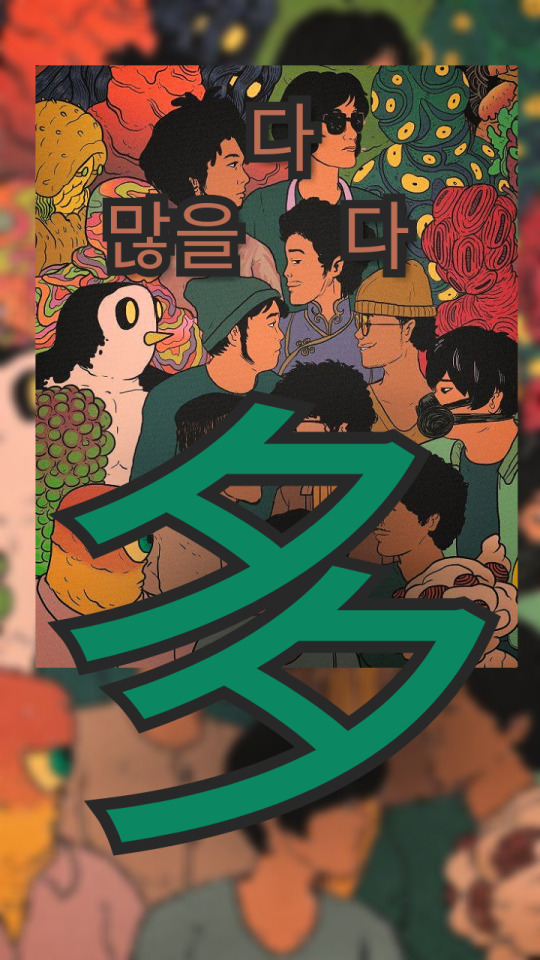
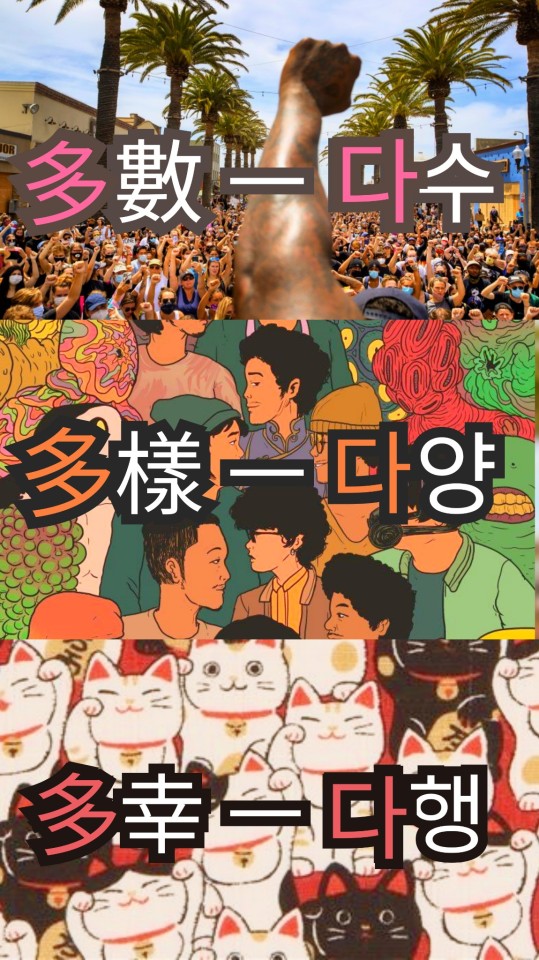
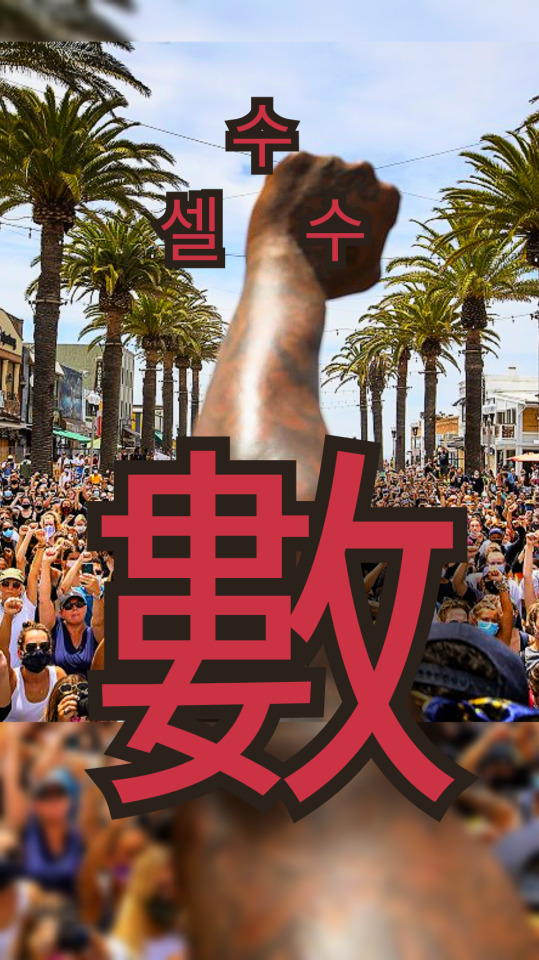



部 - 부 - 떼 부
Division / Part
Example in main pic:
大部分 - 대부분 - Most
分 - 분 - 나눌 분
Division / Part / Minute
Example in main pic:
分-분 - Minute
多 - 다 - 많을 다
Many / Most / All
Example in main pic:
多樣 - 다양 - Variety / Diversity
數 - 수 - 셀 수
Number
Example in main pic:
多數 - 다수 - Majority
全 - 전 - 온전할 전
Whole / all
Example in main pic:
全部 - 전부 - All parts
Source :https://www.howtostudykorean.com/hanja-unit-1-lessons-1-20/hanja-lesson-17/
~~~~~~~~~~
(you can ignore this. Here’s your ignore-this permission-slip. Don’t drop it)
So… Hello. I usually don’t comment on these because they feel big enough already, but whatever. I’m clearly trying out different ways of visualizing things so I hope you don’t mind the inconsistencies. Feel free to tell me if there’s a style you prefer (and why it’s better for your learning?), but you’re not my boss so no promises. No promises to my boss either for that matter.
Anyway, I’m also making a couple pics here and there kind of Black Lives Matter-y and you can’t stop me, but it does mean that I don’t necessarily use the most recognizible words for the Hanja? (Like for 수 the most obvious one is obviously “math - 수학”) You’re just gonna have to live with that.
Also I really appreciate likes and reblogs? It’s pretty motivating, but I’m not your boss either so just do your thing.
(this is why I don’t comment things here. I ramble. Stay safe out there. Bye)

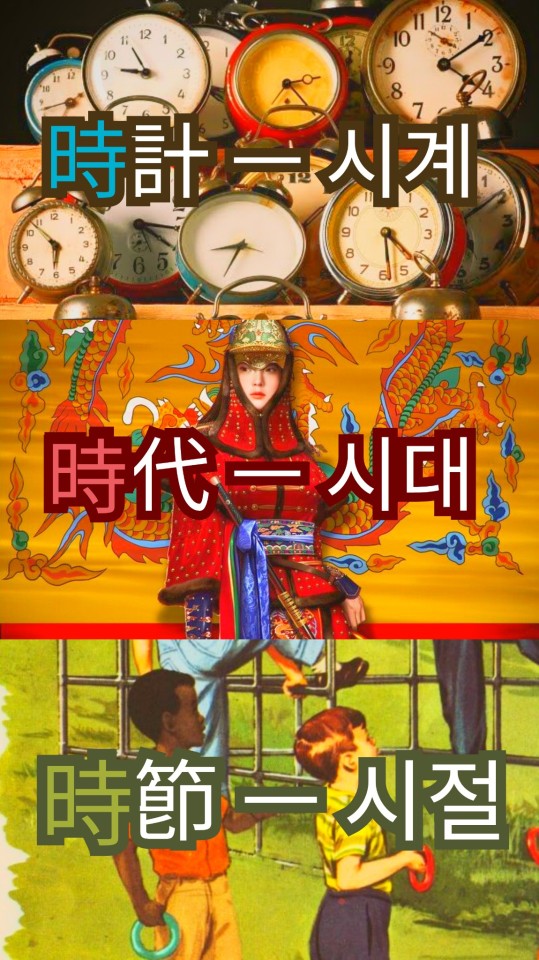


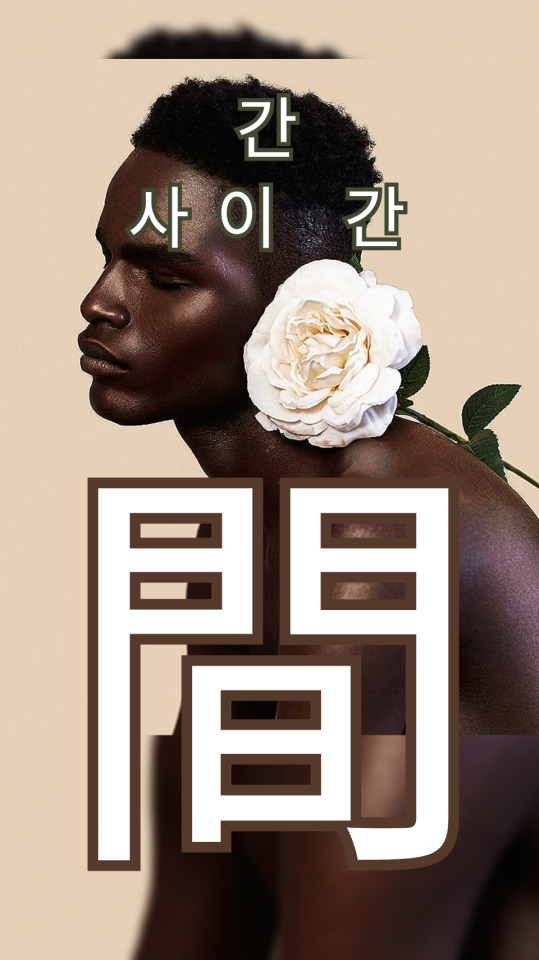





時
Meaning - Time
Korean syllable - 시
Korean name - 때 시
期
Meaning - Time, period
Korean syllable - 기
Korean name - 말날 기
間
Meaning - Space, Interval, Between
Korean syllable - 간
Korean name - 사이 간
(also used as a grammatical principle (amongst/between options/actions) and in words like 人問 (인간) meaning “human” which isn’t really related to time or space)
同
Meaning - Same
Korean syllable - 동
Korean name - 한가지 동
(동성애자 isn’t one of the examples in the lesson, but I couldn’t help myself)
(also for 共同體 (공동체 - community) I used some fanart from the TV show Community. I usually try not to use references/pop-culture, but I was bored, ok?)
百
Meaning - 100, everything, total
Korean syllable - 백
Korean name - 일백 백
Source :https://www.howtostudykorean.com/hanja-unit-1-lessons-1-20/hanja-lesson-16/



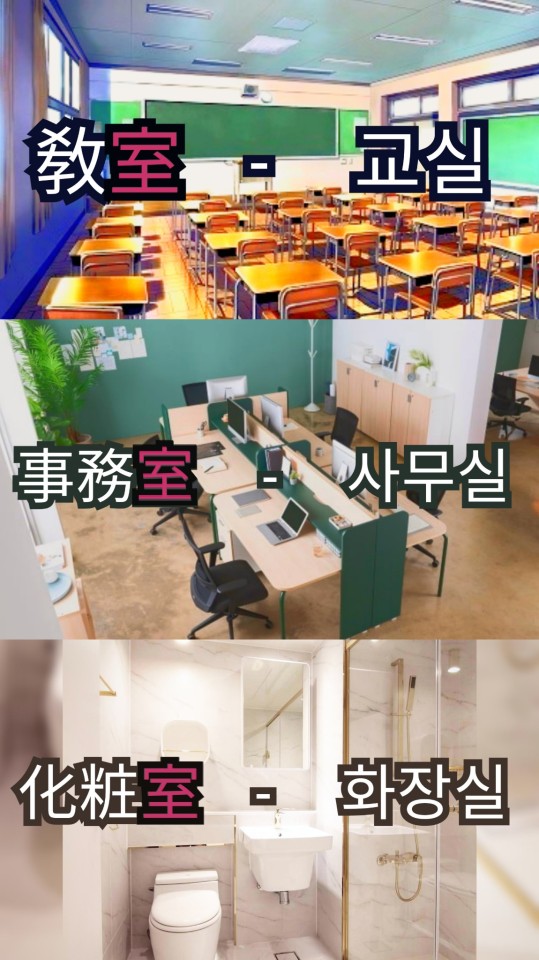
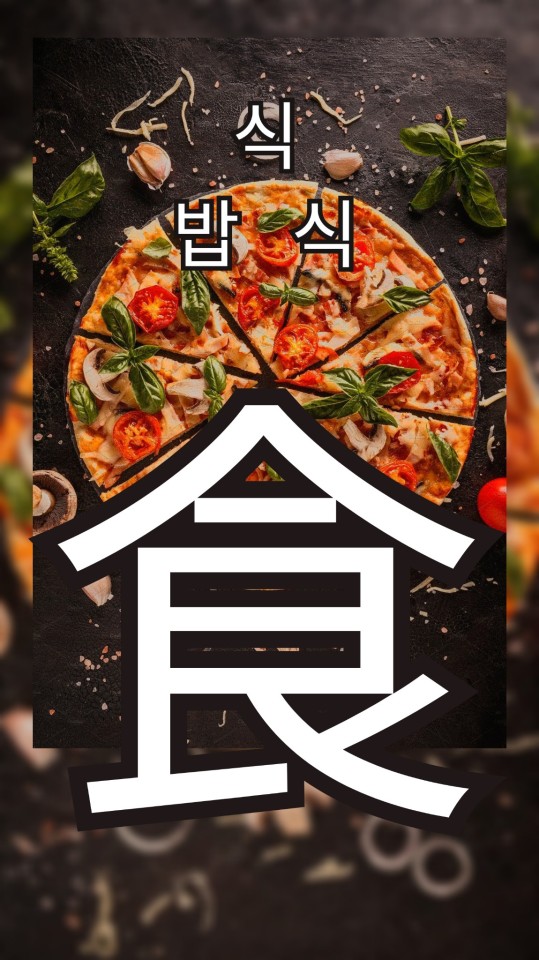




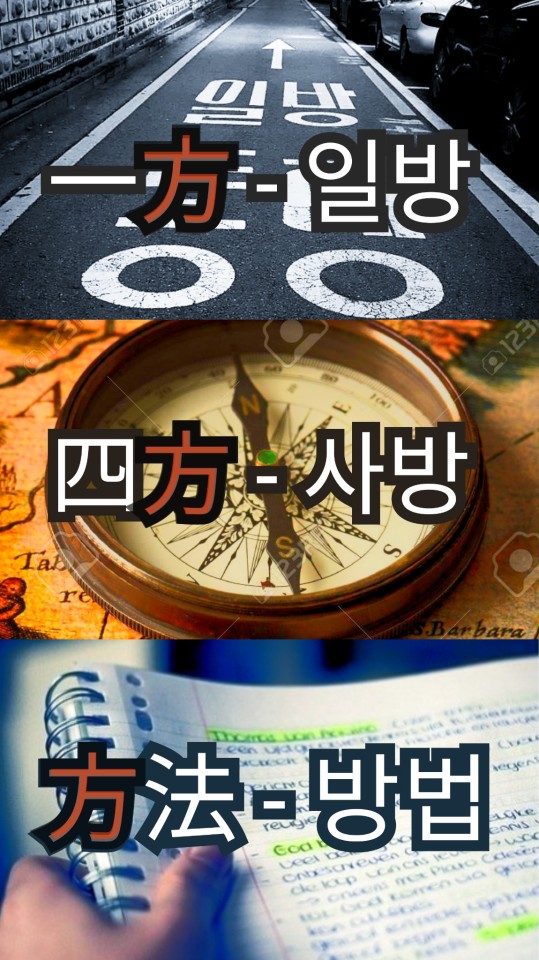
場
Meaning - Place / Location
Korean syllable - 장
Korean name - 마당 장
室
Meaning - Room
Korean syllable - 실
Korean name - 집 실
食
Meaning - Food
Korean syllable - 식
Korean name - 밥 식
地
Meaning - Land / Earth
Korean syllable - 지
Korean name - 땅 지
方
Meaning - Area / Region / Side
Korean syllable - 방
Korean name - 모 방
Source:https://www.howtostudykorean.com/hanja-unit-1-lessons-1-20/hanja-lesson-15/



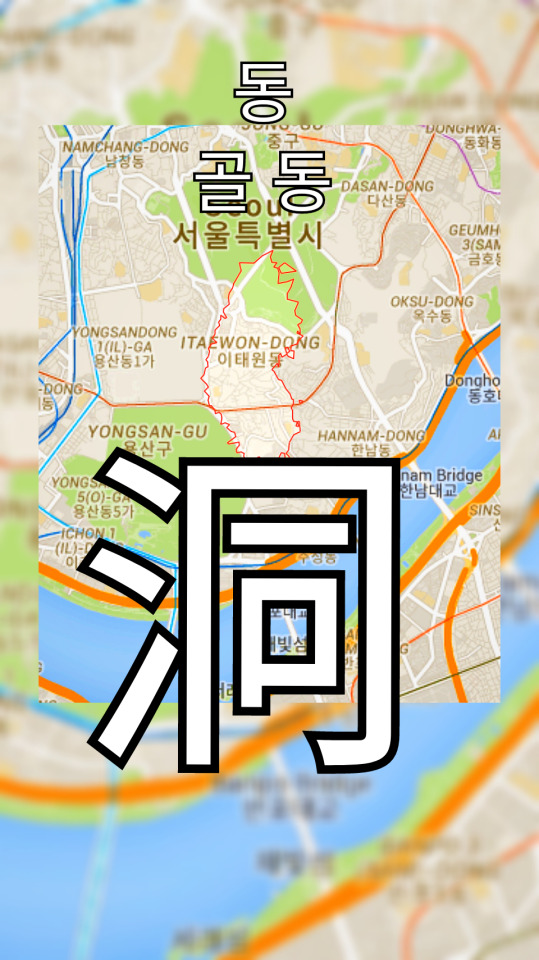

公
Meaning - Public / Shared / Equal
Korean syllable - 공
Korean name - 공평할 공
Examples
公園 - 공원 - Public park
主人公 - 주인공 - Hero, Leading role in a story
公主 - 공주 - Princess
市
Meaning - City
Korean syllable - 시
Korean name - 저자 시
Examples
市民 - 시민 - Citizen
市內 - 시내 - Downtown
者市 - 도시 - City
區
Meaning - District / Division
Korean syllable - 구
Korean name - 지경 구
Examples
區民 - 구민 - Inhabitants of a district
區域 - 구역 - Area / District
龍山區 - 용산구 - Yongsan-gu / Yongsan district. One of the 25 districts in Seoul. (pictured)
洞
Meaning - Neighborhood
Korean syllable - 동
Korean name - 골 동
Examples
洞內 - 동내 - Inside a neighborhood
洞口 - 동구 - The entrance to a neighborhood
梨泰院洞 - 이태원동 - Itaewon-dong / Itaewon neighborhood. A neighborhood in Yongsan-gu. (pictured)
合
Meaning - Combine / Unite
Korean syllable - 합
Korean name - 합할 합
Examples
統合 - 통합 - Integration
團合 - 단합 - Unity, Solidarity
合意 - 합의 - Agreement
Source :https://www.howtostudykorean.com/hanja-unit-1-lessons-1-20/hanja-lesson-14/
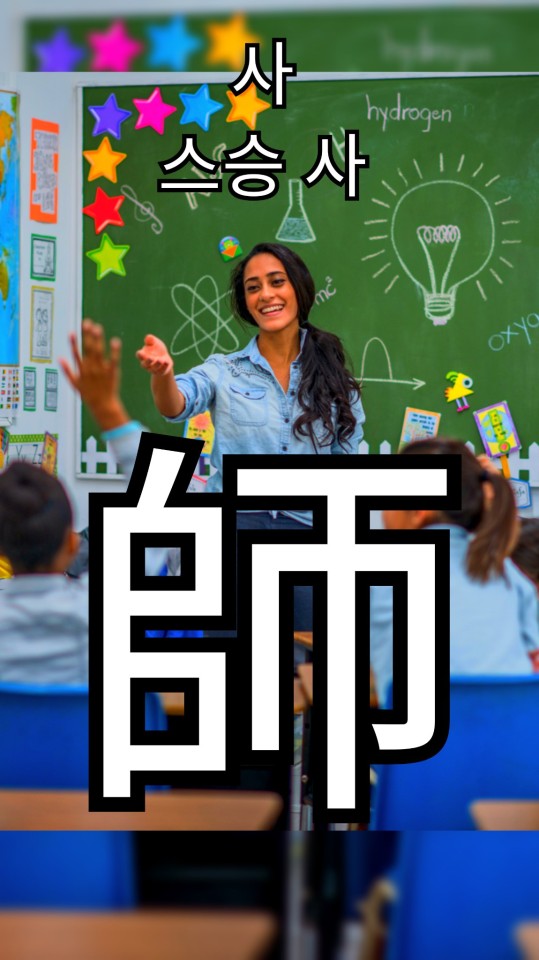
師
Meaning - Teacher (profession)
Korean syllable - 사
Korean name - 스승 사
Examples
看護師 - 간호사 - Nurrse
敎師 - 교사 - Teacher, professor
醫師 - 의사 - Doctor
Source :https://www.howtostudykorean.com/hanja-unit-1-lessons-1-20/hanja-lesson-13/

先
Meaning - First
Korean syllable - 선
Korean name - 먼저 선
Examples
先生님 - 선생님 - Teacher (님 doesn’t have Hanja)
先着順 - 선착순 - First come first served / order of arrival
優先 - 우선 - First, above all, preference, special treatment
Source:https://www.howtostudykorean.com/hanja-unit-1-lessons-1-20/hanja-lesson-13/
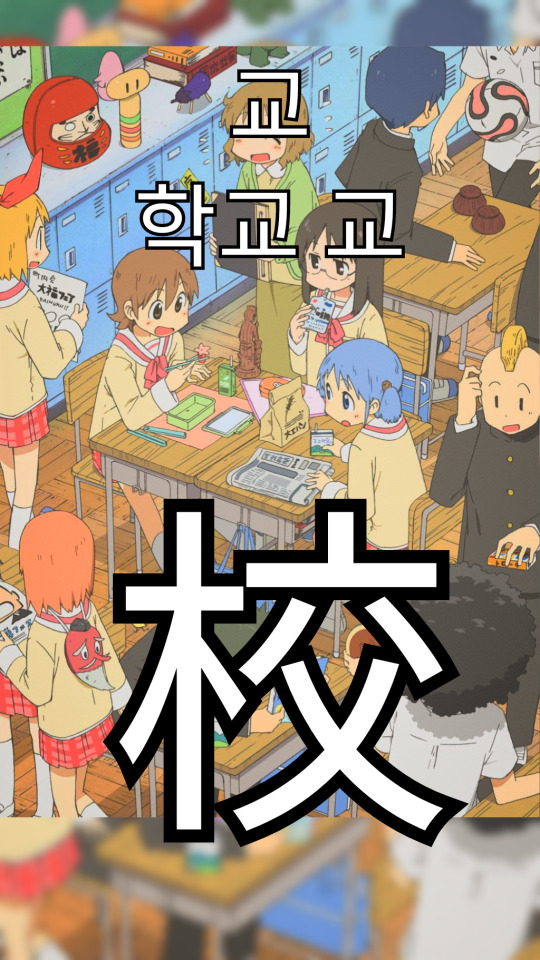
校
Meaning - School
Korean syllable - 교
Korean name - 학교 교
Examples
女學校 - 여학교 - Girls school
校內 - 교내 - Inside a school
母校 - 모교 - One’s old school / Alma mater
Source :https://www.howtostudykorean.com/hanja-unit-1-lessons-1-20/hanja-lesson-13/
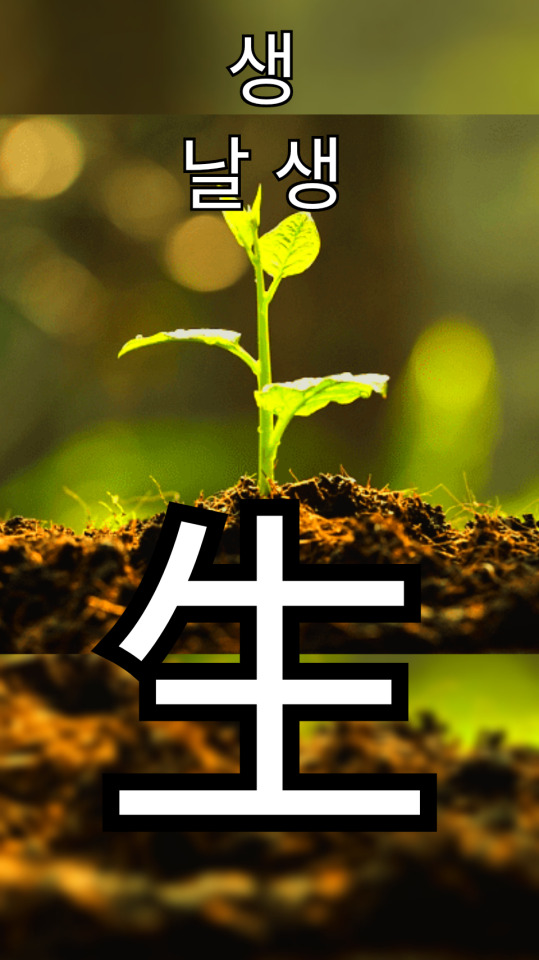
生
Meaning - Life / Birth
Korean syllable - 생
Korean name - 날 생
Examples
生日 - 생일 - Birthday
一生 - 일생 - One’s entire life
新入生 - 신입생 - Freshman
Source :https://www.howtostudykorean.com/hanja-unit-1-lessons-1-20/hanja-lesson-13/

學
Meaning - Learn / School
Korean syllable - 학
Korean name - 배울 학
Examples
學生 - 학생 - Student
學校 - 학교 - School
入學 - 입학 - To enter a school, school admission
Source :https://www.howtostudykorean.com/hanja-unit-1-lessons-1-20/hanja-lesson-13/

지진 - Earthquake
진지 - Rice/meal (polite)
